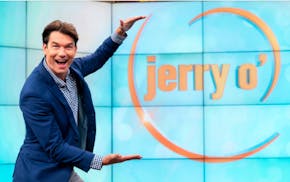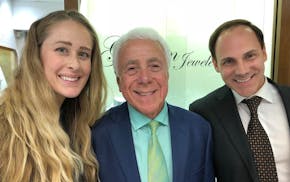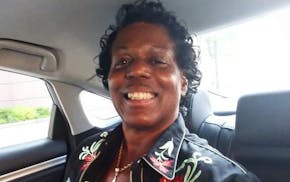Retired Carlson CEO and chair Marilyn Carlson Nelson is sold on the value of another Super Bowl in Minnesota, but she has not bought into most of what's popular on TV.
A member of the global travel and hospitality family franchise and one of the 400 richest people in America according to Forbes, Nelson is a member of the triumvirate Gov. Mark Dayton appointed to work on landing the 2018 Super Bowl, which would be the state's second. "I know if we make concessions, we get multiples of the value back for the community," she told me. "All you have to look at is the fact that every one of the other cities bidding have had the Super Bowl over and over again, so they know the secret. We have to remember it."
She'd like to forget most of what's on TV or at least make sure her grandchildren never see it, as she strongly states in this Q&A.
We also discussed the weighty social issues she takes on that keep her humble, one of which recently earned Nelson a Harriet Tubman Center "Safe Journeys Award." The honor recognizing Nelson's leadership in protecting children from sexual exploitation, included a walking stick, an instrument used by the abolitionist. My startribune.com/video features a photo of Nelson having her photo taken by someone pretty high up at the White House.
Q: You seem to have gracefully taken ownership of your success without being full of yourself. Some women struggle with that and as a result play down their accomplishments. What's the key to not doing that?
A: I'm grateful for what is perceived as success. I think that I have taken on such big things like women's rights, human trafficking — they are so overwhelming, any little progress I feel grateful for. But you don't solve these problems. So you feel humble. Also leading a big company [keeps you humble]. One day you feel successful, the next day something doesn't work or there's a recession or there's 9-11 when the towers came down and the entire airspace closed. I'm more surprised at anybody who isn't humble because I think life keeps you very humble.
Q: Do you have advice for women entrepreneurs on taking ownership of their success?
A: I think women, whether they're women entrepreneurs or women academics, need to take ourselves seriously but be less introspective every time something goes wrong. Learn from it and move on. I think it's great that young women finally are participating in competitive sports. For years men learned how to lose, get up in the morning, go back and get back on the practice field. For my generation, we didn't have those opportunities. This next generation of women is going to celebrate their wins; if they lose they are going to analyze what went wrong and get back on the field.
Q: Have the people at CBS' "Undercover Boss" contacted you?
A: No. [Extended laughter] I think some of my competitors have done that. It'd be kind of fun to do that.
Q: One of my former editors used to say that Minnesota Nice was mainly afforded white guys. What's been your experience?
A: Was your former editor a white guy? I thought maybe so [Laughter]. In some ways it's really interesting because there was a period of time where certainly people were nice to women, but being nice to women and respecting them and giving them equal opportunity were two different things. You could compliment them on their outfit, that was nice. What was really nice was when people said, I respect you. I want you on my board and we can agree to disagree on some things. That's all in the context of a positive relationship. I'm proud of Minnesota Nice. I will remember a member of the press talking to someone over the phone in New York saying, I've got to get out of here, this place is so nice. Everyone smiles at me. Everyone makes eye contact. It's really disconcerting.
Q: Have you ever telephoned one of your properties and encountered a smart-alecky employee who might have a different attitude if they knew it was you?
A: I haven't had that happen. My dad used to try [to check on the quality of service in phone calls]. Today you can see who's calling, you can see a number so it's a little bit different. But I have had the opposite. One night when I was in Washington, D.C., I had been at a meeting that ended up lasting very late. There was a storm, there was no way I could get to the airport and it was after all the businesses here were closed. I went and checked in at our hotel, a Radisson in Arlington, and nobody knew who I was. It hadn't come through my office, it was late at night, there was a night manager. I checked in and said, "I am really stuck, I don't even have a toothbrush. Is the store open?" No. So I went up to my room and got ready for bed. Didn't have any real change of clothes. There was a knock at the door. That made me uncomfortable. So I said, "Who's there," and voice said, It's the bellman. I said, "Can I help you?" because I still felt uncomfortable. I opened the door with the chain across and he said, I had to wait to my break but I ran out and got you a toothbrush. It made me so proud and I didn't tell him on the spot who I was. When I came back, I sent him some recognition. It was the opposite of what you're saying; it was when I was surprised by someone absolutely going the extra mile, who didn't have any idea who I was.
Q: That's what you want.
A: That's exactly what you want.
Q: Is there another family-run business empire you look at and think, That would be fun?
A: I guess if I was looking, it would probably be in travel and hospitality, because I love these businesses so much. It makes me so proud when some of the emerging countries [embrace us]. In India we are one of the biggest global brands and were very early there, bringing jobs.
Q: Have you even been walking around some foreign country and noticed the name of one of your businesses you didn't remember being located there?
A: It's so funny because my colleagues would say, Oh, you know where all of them are, but the truth is we were traveling as a family, the rest of the family were tired, my Mom and I could hardly wait to see St. Mark's Square in Venice. I'll never forget it, just as we came around the corner, it happened to be dusk and the lights went up. That was magical. We sat down at a cafe and looked across and there was Carlson Wagonlit Travel with a storefront on St. Mark's Square. I have to say there are certain moments where you just get a real thrill to think, "My dad borrowed $50 to start a company here in Minneapolis." There we were years later looking at Carlson Wagonlit Travel, which by the way is now the largest corporate travel company in the world.
Q: I love the name Radisson Blu. What other names were considered?
A: Do you want to hear the truth? The truth is the most elegant hotels in Europe, the Middle East and Africa, where the big gorgeous new properties were redefining Radisson … were originally Radisson SAS. We had a partner SAS. It would say "Radisson" and then there was a blue box, that said SAS. We bought them out and took the company public. We went to take the blue boxes off and there were shadows on all these properties and it looked terrible. Radisson with an empty square of brick or marble or whatever the front of the building was. We decided we had to keep something there. We thought about a heart symbol. Some of us thought it would be nice to have a C for Carlson. The internal working name was Radisson Blu, because of the blue box. All of sudden everybody says Yeah, Radisson Blu. Now it's sort of having a jewelry box. We've got a blue, we've got a green and now we're going to have a red! It is absolutely the most exciting. Blu will be more sophisticated. Red will be probably more for the millennials — high-tech, fresh, very tomorrow. That's why I love the business. [Minnesota has one Radisson Blu, at Bloomington's Mall of America, but there'll be a second in downtown Minneapolis when the renovation of that Radisson is completed this summer.]
Q: Do you have a favorite TGI Friday's menu item?
A: They have a kind of dee-vine chocolate dessert that I don't even let myself think about. I've been real excited because the new menu, thanks to some of us women executives at Carlson but also thanks to our customers, we now have a lot of salads. For a long time we had loaded potato skins and all kinds of dangerous but wonderful items. So now you can go to Fridays, even if you are not celebrating something and have a great salad. You know what we found? When we put the salads on, we sold more desserts. So people think, "If I have a salad, I can have a dessert." [Laughter]
Q: Do you have any guilty pleasures when it comes to watching television?
A: I have a lot of abhorrence to be honest. I don't watch much television. I am so uncomfortable with what is on that my grandchildren might possibly see during prime time. I have to say I am kind of in a state of disbelief. It's not me feeling guilty; somebody else oughta feel guilty that they have lost any sense of propriety for relationships that should be treasured. No. I tend to watch a lot of news because we have such a global business that what happens in the Ukraine [and elsewhere], the tornado in Kansas [all has an impact].
Q: Give me one word that describes business traits you have recognized in your grandkids.
A: We have a range, from 9 to 22. I think one of the most important traits in business is to be trustworthy. There are people who break trust and cast a bad [light] on all of us. I see them as trustworthy and that matters a lot to me. Then I could say each might have different things I can see. We have a grandson who produced the big Hasty Pudding Show at Harvard. It has been done at Harvard, in New York, Bermuda. He's got organizational skills. His brother is the head of sales, he's a salesman and my dad would love that. My dad [said] Nothing happens until it's sold. Then I have one granddaughter who jumps horses. She is the competitor. I have to say she's driven. She understands focus, discipline. I have another granddaughter who was a national debate champion, who is actually sales manager for the Harvard Crimson. She's a communicator, she's in your business. So communications, trustworthiness, sales ability, organizational skills — there's a great mix in there — and they care. You have to care about people. You have to be able to build real relationships to be a long-term success.
Q: Do you think the word "bossy" needs to be banned?
A: [Extended laughter] I think the word is kind of interesting. It used to be that people would criticize women — either they'd say they were too shy, not assertive enough. Or if they were assertive, someone thought they were aggressive or bossy. I think it's [not good if just] used as a pejorative, but you know I think there are times you need to be bossy. I am more a consensus leader but at 9-11 there are times you don't ask anybody's advice. You say: We have got to do this, this and this. It's clear you are the boss, the buck stops here and you need to use that skill.
Q: Last month your work to stop human trafficking was recognized by the Harriet Tubman Center.
A: This goes back to the first question you asked and that is: What humbles me. You think of somebody like Harriet Tubman, nothing going for her, she was born a slave. She ended up escaping, bringing [people] out of slavery in the Underground Railroad. She actually led a unit in the Civil War. These people who have this inner vision and strength are such an inspiration. [This honor is ]so nice because they give you a walking stick. She used a stick. She had some kind of accident and needed to walk with the stick. That meant so much to me and it reminded me of another walking stick of a lady I met in India. She was a wealthy, successful lady spending a good part of her time working hard on bad issues: human trafficking and use of children in brothels and the overwhelming poverty in India. I asked her, "Why aren't you out enjoying your wealth? You could be anywhere in the world and instead you are really giving of yourself." She said, Gandhi's my inspiration. All he had were spectacles, a couple yards of cloth, sandals and a walking stick. There's that walking stick again. The stick reminds me of Tubman, Gandhi and that we're each on a journey, and we need support from a walking stick or each other. There is so much to do and we need each other. As long as we have breath we can make a difference.
Interviews are edited. To contact C.J. try cj@startribune.com and to see her watch Fox 9's "Buzz."

C.J.: Jerry O'Connell gets support from Wendy Williams for talk show




